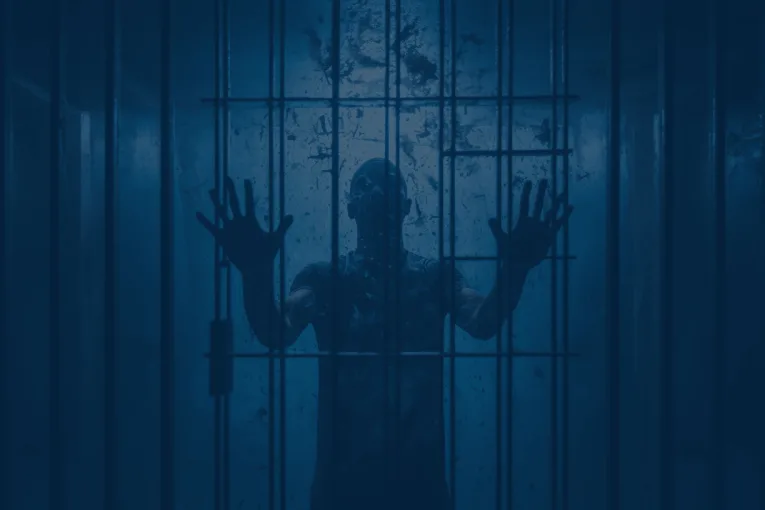
After spending more than thirty cumulative years moving through juvenile halls in multiple states, six youth authority gladiator schools, and over a dozen adult state prison facilities, I’ve developed a keenly sensitive radar for detecting sublimated blips of psychopathology playing possum beneath a practiced convict veneer. What do you imagine living on death row for twenty years while the state tries to murder you might do to your sanity?
Nothingness is a harrowing thing you always recognize after you’ve imprinted upon it. Some extremely dangerous and mentally ill people have developed an exceptionally deceptive capacity for motor control, affect moderation, and feigning a postured normalcy—but nothing can soften the darkness pooled in a pair of shark-like dead eyes devoid of empathy. When I met Greg, I looked hard for signs of that shark, but I didn’t detect it.
What I got to watch was a man slightly taller than my seventy-six inches fold helplessly into the neck of a quiet but powerful horse on the big yard at Valley State Prison and cry a silent but visceral grown man cry that looked to me as if something inside of him was wrestling with another something within the outlines of his large frame. The kind of cry that quakes through your body as you stand under the shower nozzle trying to choke down the pent-up agony of a thousand uncried cries hoping nobody hears you.
Greg couldn’t hide it standing there in the blazing Chowchilla sun in front of a hundred lifers staring at the alien among us. He tried valiantly, but his body became a rippling lake’s surface—his anguish a flat rock skimming across his failed composure. His vulnerability reminded me of the treasure residing in the wounded and unhealed parts of our fractured former selves. There is where trauma whispers the screams only we can hear. Everybody heard Greg.
Because we can appreciate what it took for him to survive more than two decades of solitary confinement on the row, resist an illegally imposed death sentence machinated by a dirty so-called judge deemed to have committed enough judicial misconduct by the appellate court that his condemnation was reversed, and then safely program while off the row long enough to get to a prison like ours, Greg’s collapse signaled to some of us a reclamation few might ever imagine is possible for one to experience. Few of us can retrace a lost life and find the innocent version of self we abandoned in the past.
The lizards, pigeons, gophers, snakes, rabbits, geese, scorpions, hawks, dogs, seagulls, and horses that share space with us all seemed to stop and take notice of all of us taking notice of Greg’s moment.
He was a twenty-two-year-old youth offender when he pulled the trigger of a .38 caliber pistol three times while admittedly high on cocaine in 1990. After being sentenced to death the appellate court reversed the imposition of his death sentence citing how the “prejudicial,” and “persistently… troubling… disparaging… sufficiently severe and persuasive” judicial misconduct committed by his trial judge conveyed the impression “he favored the prosecution.”
Let this be yet another teachable moment for us to pause, reflect upon, and consider the enormity of the deadly exercise of misguided state power that too often flexes without leash and extinguishes the lives of errant but salvageable young people under the cover of jurisprudence.
Not only did the reversal decision find that Orange County California Superior Court Judge Donald A. McCartin’s misconduct committed before the jury that convicted Greg “required reversal because death sentence was by no means a foregone conclusion,” —indeed, two previous juries had hung at trial, and the first penalty phase jury voted 10-2 in favor of sparing his life—the appellate court rebuked his on-the-record comments made from the bench before the second penalty phase jury.
McCartin, who at the time had sentenced more citizens to death than any other judge in the county, openly declared before the jury that premeditation in Greg’s case was a “gimme,” while the determination of that issue was the very purpose for which the penalty phase jury had been convened. The appellate record and reversal decision revealed a power-thrusting judge on a mission to see Greg killed. Thankfully, he failed.
Greg is now serving a sentence of life without the possibility of parole (LWOP), a punishment UC Berkeley Professor of Criminal Law Jonathan Simon recently described to me via text as “inherently cruel and unusual, although unfortunately not so unusual, due to its absolute lack of any valid penal justification, since life with parole can handle the same incapacitative rationales.” Ironically, the multiple college degrees Greg earned while California was trying to kill him have rendered him the most qualified Youth Offender Mentor in the prison.
For two decades California pursued the execution of a person they’ve now hired to mentor offenders in emotional regulation and self control. Greg is good enough to teach others, but still destined to die here, like most LWOPs. He didn’t escape death because of the Governor’s moratorium—he was released from the row by judicial decree to cure an injustice. Something is upside down about the way confined lives are trivially deemed worthy, or not.
Greg Sturm, I see you.
